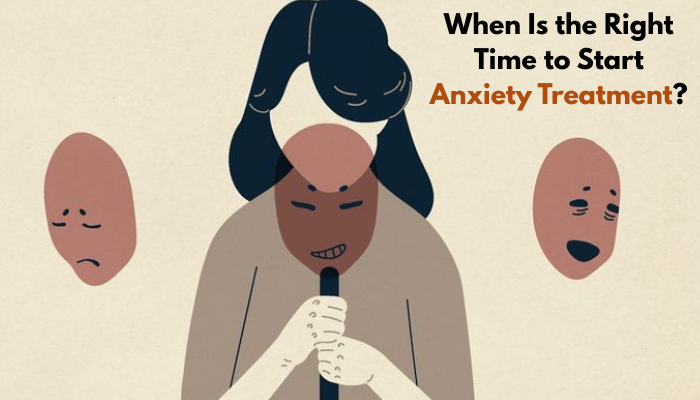Anxiety can creep into life quietly sometimes in small, almost invisible ways, and sometimes in overwhelming waves that disrupt work, relationships, and even daily routines. Knowing when to seek help is not always clear. Many people wait until symptoms become unbearable, while others hesitate out of uncertainty or fear. The truth is, the right time to consider support may arrive earlier than you think.
This guide breaks down the key signs, moments, and life situations when starting Anxiety Treatment may be the best step forward.
When Anxiety Interferes With Daily Functioning
One of the clearest signals is when anxiety begins to interfere with everyday life. Occasional worry is part of being human, but persistent anxiety can stop you from living fully.
If you find yourself avoiding activities, unable to focus at work, or struggling with tasks that once felt simple, this could be the right time to explore professional support.
Common indicators include:
- Struggling to complete regular routines
- Declining performance at school or work
- Withdrawing from social connections
- Difficulty concentrating or remembering details
When these patterns appear consistently, Anxiety Treatment may help restore balance and functionality.
When Physical Symptoms Become Hard to Ignore
Anxiety is not only in the mind it often makes its presence felt physically. Many people experience headaches, muscle tension, stomach problems, or even chest discomfort linked to anxiety.
Over time, these symptoms can escalate. What starts as occasional restlessness can become sleep disruption, fatigue, or chronic health issues. Recognizing that these physical signs are connected to anxiety can be a turning point in deciding to seek treatment.
Watch out for physical red flags such as:
- Trouble falling or staying asleep
- Regular stomachaches or digestive problems
- Rapid heartbeat or shortness of breath
- Persistent muscle aches or tension
When Coping Strategies Stop Working
Everyone develops personal ways to cope with stress exercise, journaling, deep breathing, or talking with friends. But sometimes, these strategies are not enough. If your usual outlets no longer bring relief, or if you find yourself leaning on unhealthy patterns like overeating, avoidance, or alcohol use, this may be a signal to seek outside help.
Effective Anxiety Treatment can provide healthier long-term coping tools, helping you replace harmful habits with strategies that nurture both body and mind.
When Relationships Begin to Suffer
Anxiety has a way of straining connections. It might show up as irritability with loved ones, withdrawing from friends, or constant worry about how others perceive you. Over time, these patterns can erode even the closest relationships.
If you notice that anxiety is creating distance, misunderstandings, or frequent conflict, this is a strong indicator that professional support could help. Anxiety Treatment often provides both individual relief and healthier ways of communicating and connecting with others.
During Major Life Transitions
Big changes such as moving, starting a new job, becoming a parent, or experiencing loss often trigger heightened anxiety. While some stress is expected, overwhelming fear or constant worry during these periods may suggest it’s time to seek treatment.
Catching anxiety early during transitions can prevent it from taking root and becoming harder to manage later.
Examples of transitions where anxiety may intensify:
- Entering or graduating from university
- Career shifts or workplace challenges
- Marriage, divorce, or new parenthood
- Adjusting to health changes or caregiving roles
When Anxiety Becomes Chronic Rather Than Situational
It’s natural to feel nervous before an exam, a big meeting, or a medical test. But when anxious feelings persist long after the stressor is gone or appear without any clear trigger they may signal a deeper condition.
Persistent anxiety can develop into generalized anxiety disorder, panic disorder, or phobias if left untreated. Recognizing the difference between situational worry and ongoing, chronic patterns is key in deciding when to begin Anxiety Treatment.
When Anxiety Prevents You From Enjoying Life
One of the most painful effects of anxiety is its ability to rob you of joy. Activities you once loved meeting friends, pursuing hobbies, or even relaxing at home can become overshadowed by worry or fear.
If you notice that happiness feels out of reach, or that every decision is clouded by what could go wrong, it may be time to seek help. Treatment can open the door to rediscovering enjoyment and peace of mind.
When Anxiety Feels Overwhelming or Out of Control
Sometimes anxiety escalates to the point where it feels like it controls you, rather than the other way around. Panic attacks, constant intrusive thoughts, or overwhelming dread can signal the urgent need for professional guidance.
If you’ve reached the point where anxiety feels bigger than your ability to manage, it’s not a sign of weakness it’s a sign that structured, evidence-based support is needed.
When Trusted Friends or Family Express Concern
Often, others see the impact of anxiety before we do. If people close to you have expressed worry about your stress, withdrawal, or constant nervousness, take it seriously.
It can be difficult to view our own struggles objectively, but outside observations often highlight when it’s time to take the next step. Listening to these concerns may lead you toward life-changing support through Anxiety Treatment.
When You’re Ready for Change
Ultimately, the best time to begin treatment is when you feel ready. Some people reach out early, while others wait until anxiety becomes unbearable. What matters most is the willingness to seek support and the openness to try new strategies.
Professional help is not about erasing anxiety altogether it’s about learning how to live alongside it in healthier, more manageable ways.
Final Thoughts
The right time to start Anxiety Treatment often comes earlier than people expect. Whether anxiety is interfering with daily life, straining relationships, or causing overwhelming distress, seeking support is a powerful step toward healing.
Treatment offers not just relief, but also tools for building resilience, improving health, and rediscovering joy. If you recognize yourself in these signs, consider reaching out sooner rather than later.
As someone who has both experienced and witnessed the difference therapy can make, I believe finding the right professional is crucial. If you’re searching for an anxiety therapist Philadelphia, I can confidently say that taking that first step toward support may become one of the most meaningful choices in your journey to healing.
Looking for guidance specifically for younger individuals? Check out our blog on Who Can Help With Anxiety Treatment for Teens? to find tailored support options.

